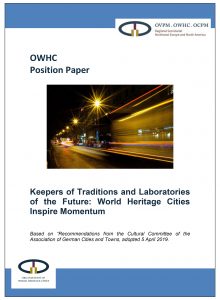Hue
Vietnam
Keepers of Traditions and Laboratories of the Future (2020)

Coordination: Matthias Ripp, Regional Coordinator of the Northwest Europe and North America Regional Secretariat of the OWHC
Editorial Work: Monika Göttler, Matthias Ripp, supported by Colleen Swain and Melissa Stevens
Category: Position Papers
Year: 2020
Language: English
Summary: Recognition of a historic town or a city district as a UNESCO World Heritage site is the highest international distinction given for preservation. Even more than with other World Heritage sites, urban sites are particularly challenged to withstand and balance the tensions between tradition and modernity and preserving historical heritage and developing a vibrant city. The distinction opens up new economic prospects, especially in tourism, but it can also have its drawbacks, for example in the impact of large numbers of users visiting a site. In addressing these issues, new impulses arise to integrate urban development—which also benefit cities that are not World Heritage. The aim is to heighten a city’s own profile, to develop a shared city identity that draws on both a European and global context, and to promote social cohesion. In view of the current challenges of globalization, climate change, immigration and social segregation, these goals and the ways in which they are operationalized are very important.


